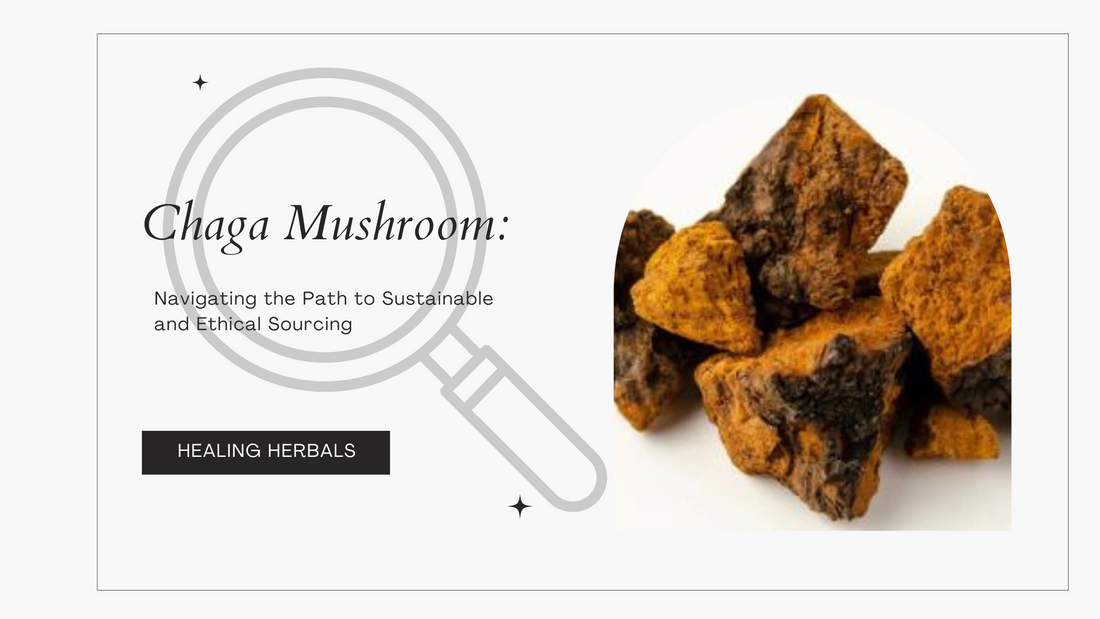
Chaga Mushroom: Navigating the Path to Sustainable and Ethical Sourcing
Share
Chaga mushroom, the mysterious "black gold" of the forest, attracts herbal enthusiasts and eco-conscious consumers alike with its unique charm and allure. As interest in its potential Chaga mushroom benefits reaches a fever pitch, the imperative to examine its sourcing practices grows more urgent. How sustainable is Chaga sourcing? Are the harvesting methods truly ethical? This article will guide you into the sensitive balance between nature's benevolence and human trading by stressing responsible Chaga harvests that support prosperity for the environment and the local populations. Learn in this complicated story how thoughtful decisions can create a sustainable future for this incredible fungus.
Traditional Uses and Cultural Significance
Chaga has for long been an important part in folk medicine, especially as practiced among the Siberians, Asians, and Native Americans. The manifold benefits of the Chaga mushroom have put it in soothing teas and potent tinctures that bridge a divide between natural healing and cultural legacy. Dependence on Chaga among these groups is much more than merely a source of medicine but a very profound symbol of ecological balance and resilience.
Ecological Role of Chaga
2.1 Habitat and Growth Conditions
Chaga grows best in temperate climates and thrives best in the cooler climates of northern latitudes. It has a mutualistic relationship with birch trees that is crucial; the fungus takes nutrients while at the same time enriching the tree's ecological role. This interplay needs to be understood in order to understand the environmental implications of sustainably sourced Chaga.
2.2 Mutualistic Relationship with Birch Trees
Chaga presence is often taken as a proxy for the health of birch ecosystems. While it can drain the strength of individual trees, its role in the broader ecosystem helps create biodiversity. Therefore, the sustainability of the harvesting of Chaga is inherently linked to the preservation of the arboreal giants that house the diversity of wildlife along with their lush surroundings.
Sourcing Methods
3.1 Wild Harvesting
The majority of Chaga is wild harvested. The process of going for the wild fruiting bodies in nature causes considerable concerns of overharvesting. Ethical ways of collecting Chaga can only be achieved when aware of nature's cycles so a percentage of the fruiting bodies can be left there, thereby allowing it time to reproduce again.
3.2 Cultivation Methods
With regard to the concerns of sustainability, some farmers have adopted the culture of Chaga cultivation in a controlled environment. This not only reduces the pressure on the wild population but also ensures a steady supply. However, growing Chaga is not without its problems, especially when it is attempted to mimic the exact conditions found in its natural habitats, which may drastically alter the chemical composition of the mushroom.
Sustainability Issues
4.1 Impact of Wild Harvesting on the Ecosystem
The impact of wild harvesting on ecology is therefore complex and multi-dimensional. Even though foraging has a potential to be sustainable, uncontrolled harvesting presents a threat to the forest ecosystems' fragile balance. Thus, it becomes significant to keep the harvesters well- informed on sustainable sourcing techniques for Chaga that have a minimal adverse impact on the environment.
4.2 Regenerative Cultivation Techniques
Regenerative cultivation methods used in Chaga cultivation serve the purpose of producing it and reviving the environment. Methods such as permaculture and agroforestry not only help Chaga production but also boost biodiversity. This way, growers could not only contribute to nature's well-being but would also meet the growing requirement of this incredible fungus.
Practices of Ethical Source
5.1 Fair Trade and Community Engagement
Ethical chaga sourcing promotes fair trade. The harvester receives just compensation for his or her labor. Involving local communities in harvesting encourages social responsibility and supports indigenous practices. Such collaboration can improve livelihoods and create a profound sense of stewardship for natural resources.
5.2 Certification Standards for Sustainable Harvesting
There are many certification standards that can guide consumers to make responsible purchasing decisions. Organizations that support sustainable sourcing provide guidelines focusing on stewardship of the environment and ethical labor practices. Therefore, by making a choice of certified products, consumers can play an important role in fostering a more sustainable market.
Challenges in Sustainable Sourcing
6.1 Overharvesting Concerns
Perhaps one of the greatest threats to Chaga sourcing is overharvesting. The more natural remedies people require, the faster they are demanding Chaga mushrooms, leading to methods that are dangerous in the long term. In addressing this, cultivating awareness and education are very important for bringing consumers and harvesters on board in terms of practicing sustainability.
6.2 Environmental Changes and Their Effects
Climate change and deforestation also pose a great threat to Chaga populations. The actual conditions that are necessary to grow Chaga are most probable to be disturbed by a change in weather, although habitat loss is an immediate hindrance to the sustenance of Chaga sourcing. Addressing these concerns in general will be integral to Chaga sourcing in the future.
Conclusion
7.1 Summary of Ethical and Sustainable Practices
Conclusion The sourcing of Chaga mushroom weaves a complex tapestry with strands interlinked towards ecological, ethical, and economic purposes. Unraveling the intricacies of wild harvesting, cultivation techniques, and the significant need for sustainable methods would create a path towards preserving this precious resource.
7.2 Future directions for Chaga sourcing
As we look out to the horizon, it will be critical that innovation in best sustainable practices complement consumer education toward an ethical future of Chaga harvesting. This will depend on whether ecological integrity and community engagement are major drivers in determining the trajectory of Chaga sourcing in such a way that might send it down the track to sustainability and nature respect.
Chaga Mushroom from Healing Herbals:







